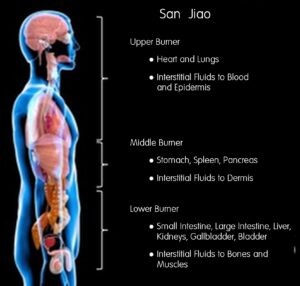A New Organ Discovered? Is it REALLY New?
You may have heard in the news recently that Western Medicine has “discovered the largest organ in the body” that was previously unknown. It’s called the Interstitium and actually has been known for thousands of years as the San Jiao in Chinese Medicine. While Western medicine is just now coming to understand this “new organ”, it has long played a key role in Chinese Medicine. The San Jiao or Triple Burner as it’s sometimes called, it is said to “be everywhere”, and corresponds to the various metabolic processes of the body and the distribution of the nutrients that result from these processes. Western medicine describes it as being like an “open, fluid-filled highway.”
The Three Burners
The term San Jiao is many times translated as Triple Burner because it is related to three metabolic processes:
- The Upper Burner includes the Heart and Lung systems and metabolizes the air we
 breathe so that it can be absorbed directly into the blood.
breathe so that it can be absorbed directly into the blood. - The Middle Burner is commonly what we refer to as our digestive process. The stomach breaks down the food we eat, and begins separating the “pure” from the “impure”, meaning the stuff our body needs is separated from the stuff we don’t need. The first separation of pure nutrients creates the interstitial fluids like saliva, sweat, tears, synovial fluids and mucous that go to our muscles, skin, bones and blood. The impure goes on down to the lower burner for further processing.
- The Lower Burner is where our body does a further separation of the pure and impure. The pure is absorbed via the small intestines and also goes to the gallbladder to create bile to moisten the intestines, and the impure is eliminated as waste via urine and feces. It’s this final separation of pure nutrients that is sent out to our organs and every cell in our body.
Even without an in-depth understanding of how our bodies work, you can probably see how a breakdown in any of these distribution processes can cause health issues.
A breakdown in the upper metabolic processing can impact the oxygen levels in our blood. We need oxygen in our blood where it can be delivered to our cells to create energy. If we don’t get enough oxygen, cells die. We simply won’t have the fuel for our body to function. Fatigue and muscle weakness is often related to low oxygen levels.
A breakdown in the middle metabolic processing has huge impacts. If the stomach, spleen and pancreas aren’t functioning properly, we simply aren’t able to separate the pure from the impure and aren’t getting the nutrients our cells need. This can lead to an impaired immune system because our lymph doesn’t contain enough immune fighting capability. Or we aren’t able to metabolize fluids properly leading to edema, water weight gain, fluid around the heart, excessive sweating or lack of sweating and diarrhea. This can even affect our mental capabilities leading to dementia, forgetfulness or feeling foggy headed.
A breakdown in the lower burner can lead to constipation and urinary issues, and if we aren’t able to absorb the nutrients via our intestines, our organs become unhealthy and weak. Or worse, if our separation of pure from impure is impaired, our organs can become poisoned.
To say that the San Jiao or this “newly discovered organ” is critical to our bodies is an understatement! I am always amazed at how the Chinese Medicine practitioners figured this stuff out thousands of years ago.
How Does This Apply to Acupuncture?
So you may be wondering how we affect all of this with acupuncture. The interstitial fluids also conduct electrical current and it is this electrical current that acupuncture taps into. We can direct our treatment to increasing the body’s ability to digest and absorb the food we ingest. We can increase the production and reserves of energy that our body needs and we can affect the metabolism of the body.
Who knew? It’s wonderful that Western Medicine is finally discovering this and will only help to improve our understanding of how the human body works and improve our health.
